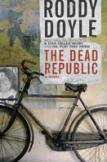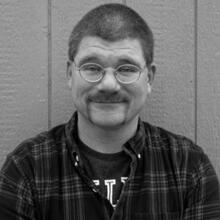Henry's Final Act
The population of Ireland currently hovers around that of Norway, Croatia, Costa Rica and Moldova. But given the number of books that explore Ireland’s turbulent history, you would think this island of saints and scholars was roughly the size of two Chinas and an India. Then again, if you count the diaspora, that seems to be the size of the global Irish nation.
Back in 1999, on the cusp of the 21st century, the best-selling author Roddy Doyle embarked on an ambitious attempt to present an alternative view of Ireland’s bloody 20th century. Doyle—best known for such raucous working-class novels as The Commitments and The Snapper, as well as the Booker Prize-winning Paddy Clarke, Ha Ha Ha—created the character Henry Smart. First introduced in the novel A Star Called Henry, Smart is a kind of Irish Forrest Gump, with a penchant for showing up at key moments in his nation’s history. So Henry—a child of the worst Dublin slums—is in the General Post Office during the Easter Rising of 1916, fighting the British alongside Pearse, Connolly, Collins and other Irish martyrs familiar to anyone who has ever heard a rebel ballad.
In fact, you might say that’s the problem Doyle was looking to solve, or at least play with. In A Star Called Henry, the Irish rebels are not exactly the poetic dreamers and warriors of myth. They are flesh and blood men (and women), which means they can be petty and vindictive rather than heroic. Doyle also confronted conflicts within the rebel movement, leaving Henry, by the end of the book, to wonder why any poor kid would fight alongside some of these middle-class stiffs. A Star Called Henry wasn’t exactly revolutionary, but it was a bold reappraisal of a cherished version of Irish history.
Henry Smart appeared next in the equally bold though not quite as well executed Oh, Play That Thing, in which Henry (having fallen out of favor with the I.R.A.) heads to America. Unlike other Irish immigrants, Henry is not interested in becoming a cop or fireman. Instead, he dives into Prohibition-era Manhattan night life before shuffling off to Chicago, where he becomes manager for an up-and-coming musician named Louis Armstrong.
Now we have the final installment in Doyle’s Henry Smart trilogy. The Dead Republic begins with a look at another famous American popular artist: the film director John Ford. The year is 1951. Henry, we learn, is going to have his life story—of poverty, sex and violence—told on the big screen by the famous Irish-American director. The name of the film is going to be “The Quiet Man.” It is one thing to tarnish the memories of beloved Irish rebels. But “The Quiet Man”? Doyle risks finding himself on the wrong of end of a Hibernian fatwa.
Indeed, Doyle could have given in to the temptation to mock “The Quiet Man,” its legions of fans and its cozy view of Irish life. What we get, however, is a battle of wills between Henry and Ford (who actually did employ an “I.R.A. advisor” on the set of “The Quiet Man”). The ex-rebel wants his life story (as well as history) told unflinchingly. But Ford, the entertainer as historian, believes romance, jump cuts and bright colors will also be required.
“What was in the script now wasn’t what we’d written,” Henry laments. “The race across the country to save the rebel’s life had become a race on a beach for a woman’s bonnet.”
“The Quiet Man” section of The Dead Republic is entertaining, if a bit long. The novel, from there, sags a little. Henry plays vigilante, threatening abusive school teachers and unwittingly catching up with women from his past. Doyle’s prose is generally curt and muscular, though occasionally it seems simply terse. There are, though, occasional moments of hilarity, with keen insights into the human soul, particularly the Irish variety.
The Dead Republic picks up steam nicely by the time the hunger strikes of the 1980s roll around. Bobby Sands becomes an international icon, and Margaret Thatcher plays her role as villain more sharply than even John Ford could have imagined. As the I.R.A. wages war, Sinn Fein and others were, if you will, waging peace behind the scenes.
“Good suits had to be bought, bad hands had to be shaken,” Doyle writes. In the end, Doyle depicts Henry Smart—and presumably those who share his hopes, if not quite his colorful experiences—as a pawn (albeit an important one) in a game of history, during which even the slightest bit of power can corrupt. But Doyle’s hidden history of the Irish 20th century is not merely cynical. History is diplomacy and politics, sure. But it is also music and movies, and often the result of contradictory forces and unintended consequences.
The Dead Republic is far from a perfect book. Overall, however, Doyle’s trilogy is provocative, impressive and an important part of an ongoing conversation about the Irish past and the nature of history. It really would have been interesting to have Henry Smart survey the Ireland of the 1990s and 2000s, the Celtic Tiger years. Then again, Doyle may be scribbling away at such a tome as we speak.
This article also appeared in print, under the headline “Henry's Final Act,” in the June 21, 2010, issue.








